Mimecast's B2B Marketing Playbook
How South African founders Peter Bauer and Neil Murray redefined cybersecurity with sustainable growth, bold leadership, and a game-changing marketing strategy.
Peter Bauer was a support technician at South African Breweries when an email virus infiltrated the company's network. With no Google to rely on at the time, Peter and his team restored operations after consulting an expensive Finnish cybersecurity firm.
Happy to be back in action—and occasionally paid in beers—Peter probably didn't know then that he and another South African techie, Neil Murray, would go on to build one of the largest global cybersecurity firms: Mimecast.
With a mission to stop bad things from happening to good organizations, Mimecast Mimecast has achieved significant growth through its growth principles and marketing tactics.
In this playbook, we will review 3 Growth Principles, 3 CMOs, 10 Tactics, and Mimecast’s Marketing Statistics, all illustrated with Examples and 🔍 Inside Scoops.
3 Growth Principles
Building a Company Without VC Funding
Mimecast’s growth in both revenue and reputation stems from its strategic funding approach. From the very beginning, the co-founders prioritized preserving the company’s culture and chemistry. They recognized the risks of partnering with venture capitalists.
Peter and Neil were committed to building a sustainable business, not just seeking quick wins. They sought investors who would support them financially, and thus raised funds through angel investors. By tapping into a network of high-net-worth individuals and friends, they secured around $10 million to help launch Mimecast in 2003.
“We knew that there had to be clear control and leadership; a business cannot be a democracy. There also needs to be a real concern for the stakeholders who sustain the long-term success of the company — the customers, employees and partners. This approach gives you the best opportunity for long term success.”
- Peter Bauer
🔍 Inside Scoop
Mimecast's decision to avoid venture capitalists may also reflect Peter Bauer’s resistance to authority. The son of a high school teacher, Peter left school and started working at the age of 19, selling school supplies.
By 23, he had founded his first company, FAB Technology, which later evolved into News24. Peter was driven by a sense of adventure, a realization that he wasn't particularly employable, and a strong desire to work on his own terms.
Creating Actionable Intent Matrix (AIM) factors
After noticing a consistent trend among marketing, engineering, product, and finance teams to cater to Sales, Mimecast’s management implemented AIM factors to establish a sovereign business model. This initiative empowered non-revenue teams with intent-driven goals to counterbalance Sales-focused objectives.
For marketing, this meant targeting measurable outcomes, like increasing website visits by X% within a set timeframe. For engineering, it focused on product enhancements through social listening rather than reacting to individual sales requests. AIM factors gave teams more autonomy, enabling quicker issue resolution and fostering sustainable growth.
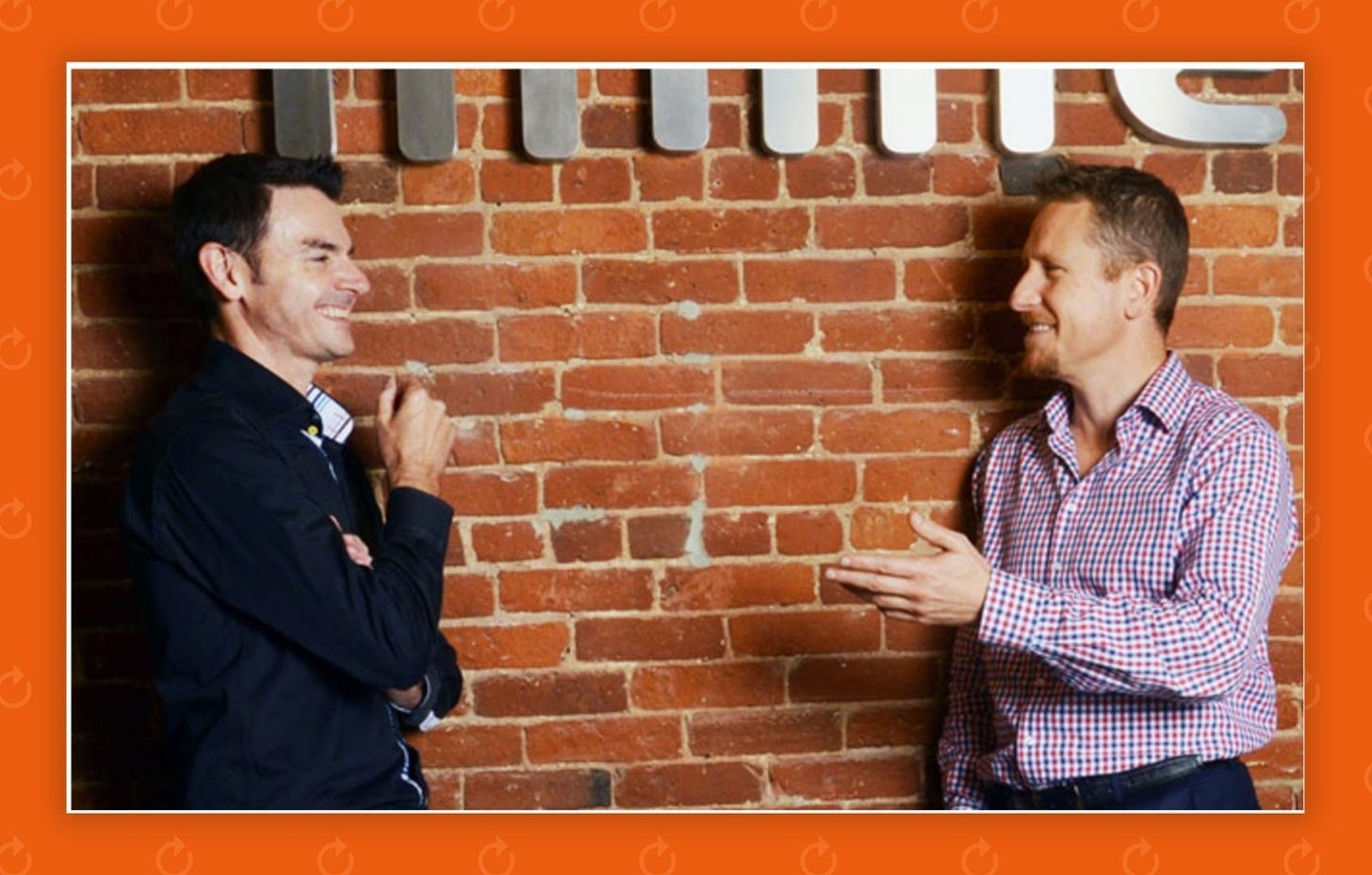
Crafting a Sustainable Business Model
When subscription models were still rare, Mimecast introduced an all-in-one service that significantly lowered the cost and complexity of email management. While securing upfront payments was important, the true focus was on building a sustainable business.
The subscription model provided an opportunity to refine products and deepen customer relationships. This ongoing value exchange, with customers committing to monthly or yearly payments, gave Mimecast the advantage of long-term, strategic growth.
I don't think I'd survive a day as a CEO of a company that was selling a perpetual license model because that's feast and famine all the time. That can be brutal. The subscription business model is significantly more forgiving and I think it creates opportunities for founders who are not born as CEOs to succeed.
- Peter Bauer
🔍 Inside Scoop
By 23, Peter Bauer had teamed up with friends Simon Andrew and Craig Fullerton to run a tech company in Cape Town. Not long after, a buyer from Johannesburg swooped in, looking to strike a bargain deal. After a night of wining and dining Peter and Simon in Camps Bay, the buyer almost convinced them to sell FAB Technology for just R30,000 ($3,390).
Hungover and ready to accept the next morning, Peter thought the split seemed impressive—10 grand each. Luckily, a sober Craig, who missed the dinner, refused the offer. Eleven months later, they sold the company to Idion for R20 million ($2.3 million).
Mimecast’s CMOs
Alex Bender, CMO of Mimecast from Feb 2016 - Feb 2021
Alex Bender served as Mimecast’s CMO (SVP) for five years.
He holds a bachelor’s degree from the University of Missouri and has worked at multiple organizations, including Cyware, Invicti Security, ReliaQuest, Onapsis, RSA Conference, RSA, The Security Division of EMC, Archer Integrated Risk Management, McAfee, Unicru, Tripwire, LaCie, and Sprint.
Bernd Leger, CMO of Mimecast from May 2021 - Dec 2022
Bernd Leger led Mimecast’s marketing for over 1.5 years.
With an undergraduate degree from Georgetown University and an MBA from Ludwig-Maximilians-Universität München, Bernd’s experience spans multiple companies, including Cornerstone OnDemand, Nexthink, Checkmarx, CloudLock, Localytics, Rapid7, Veracode, Oblicore, NaviSite, and Point Information Systems.
He is a founding member of CMO Huddles and has also been an advisor to Cornerstone OnDemand Foundation, HYPR, Stage 2 Capital, FXP, GTMfund, and Venture Guides.
Norman Guadagno, CMO of Mimecast from Nov 2022 - Sep 2024
Norman Guadagno served as Mimecast’s Chief Marketing Officer until his departure in September 2024.
He holds a bachelor’s degree in Psychology from the University of Rochester and a master’s degree in Psychology from Rice University. Norman has held key positions at several companies, including Norbella, Acoustic, Carbonite, Wire Stone, Methodologie, Microsoft, ZAAZ, Qpass, Primus Knowledge Solutions, Oracle, Internet Profiles Corp., GO Corporation, and Ashton-Tate.
Like Bernd, Norman is also a founding member of CMO Huddles and has served as an independent consultant and advisor on multiple occasions.
Mimecast’s Marketing Tactics
1. Lean Product Portfolio
“Google is as much a psychological success as a technological one. Google understood that if you're just a search engine, people assume you're a very, very good search engine.”
– Rory Sutherland
Mimecast’s marketing success hinges on the "Expertise Heuristic"—the idea that a specialized focus conveys high competence and reliability. Mimecast’s tightly focused portfolio mitigates email risks through security, continuity, and training tools.
By concentrating on its core domain, Mimecast reassures customers of its deep commitment to cybersecurity. With rising costs across sectors, CISOs are increasingly unwilling to risk security gaps, making Mimecast’s expertise a trusted choice.
2. Social Proof and Resources
Mimecast employs a powerful psychological strategy in its marketing: social proof. Its extensive resource library features customer testimonials, industry awards, analyst reports, infographics, webinars, whitepapers, solution briefs, blogs, and case studies.
A company trusted by top organizations and analysts like Forrester, Gartner, and HIMSS is unlikely to risk its reputation with unreliable products. This social proof helps influence decisions in Mimecast’s favor.
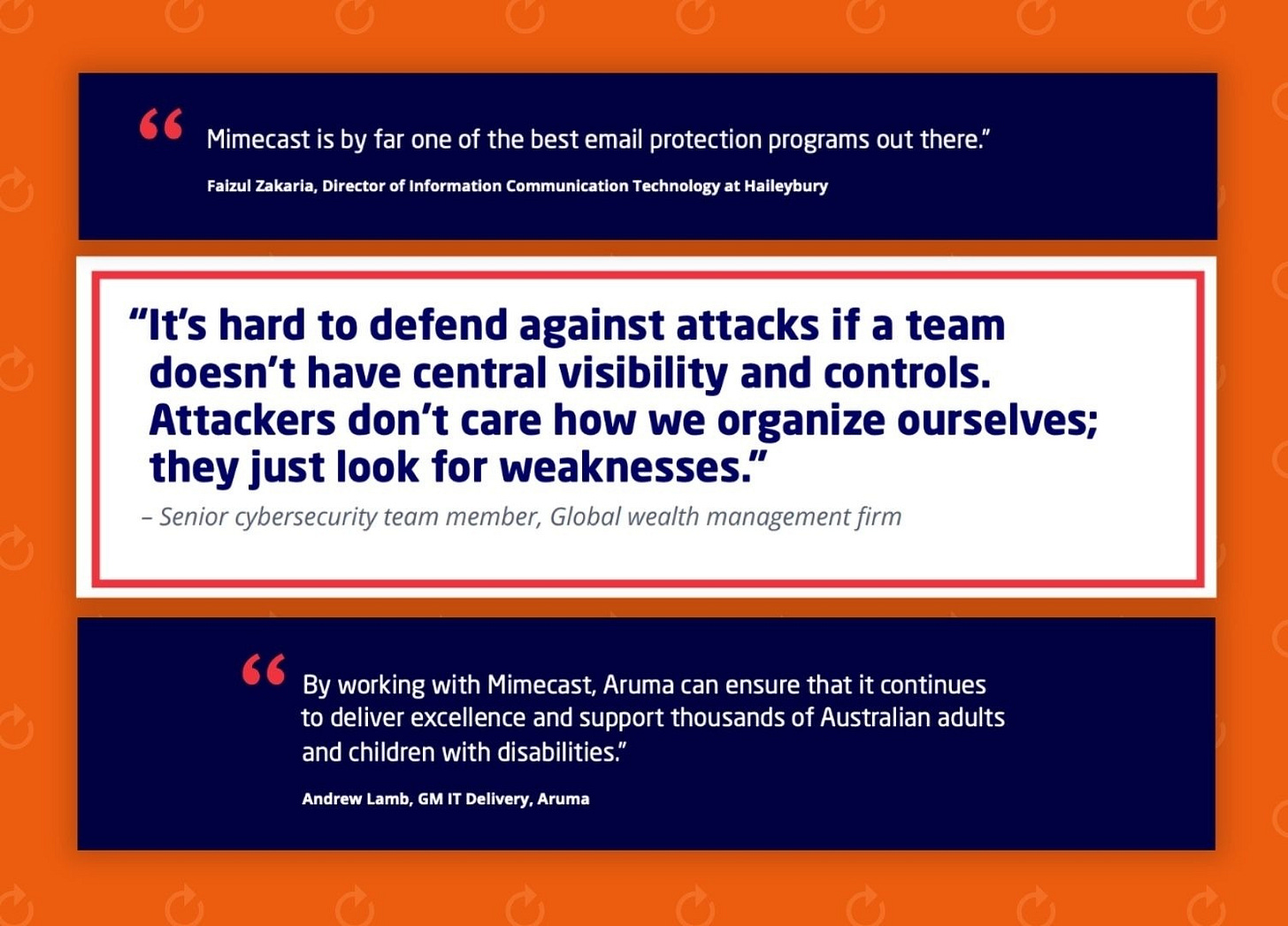
🔍 Inside Scoop
In 2022, leveraging its strong social proof, Mimecast caught the attention of private equity giant Permira, which acquired the company in a $5.8 billion all-cash deal. After six successful years on NASDAQ, Mimecast was taken private.
The move came just nine months after its biggest rival, ProofPoint, was acquired by another private equity firm. Permira continued expanding its cybersecurity portfolio by acquiring McAfee, another leader in online protection, for over $14 billion.
3. Social Media Marketing
Mimecast's LinkedIn, under hashtags #workprotected and #themimecastway, features diverse content, including industry events, volunteering posts, and resource promotions. Despite frequent updates, engagement remains low, with minimal comments — similar to Facebook.
The company is more active on Instagram, effectively engaging with comments. YouTube provides training, employee testimonials, and customer stories, valuable for new hires and users. Twitter highlights events and acts as a support portal, though responses can be slow, but its witty posts make it worth sticking around.
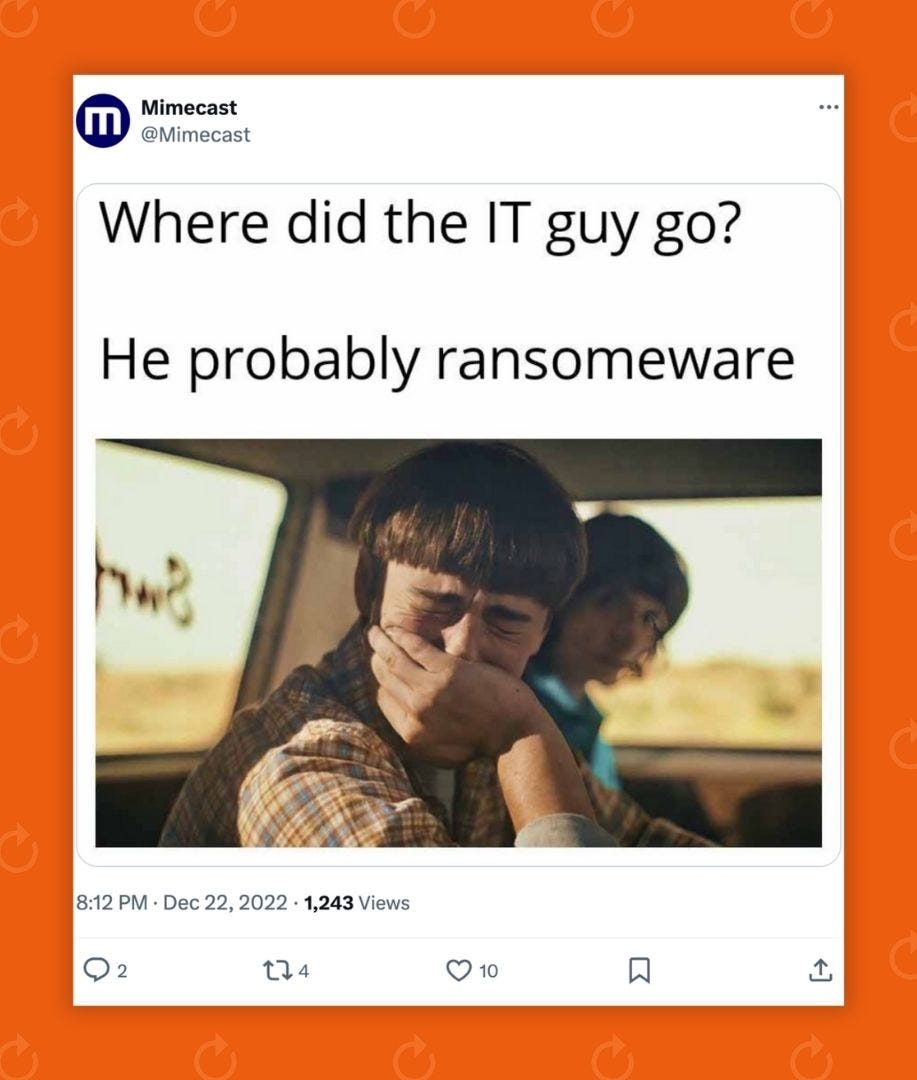
4. Event Marketing Strategy
Events play a key role in Mimecast's marketing, boosting brand recognition at major conferences like Black Hat USA, InfoSec, RSA Conference, Forum InCyber, and it-sa. This approach has expanded visibility in regions like France, Singapore, Hong Kong, and Malaysia, where Mimecast plans to attend Les Assises and GovWare.
Mimecast strengthens its industry presence by hosting events like TechConnect and APAC Connect, with main-stage talks and thought leadership panels. As the company grows, participation is expected in new markets with interactive exhibits, speaking sessions, trivia, giveaways, and possibly more crêpes.

🔍 Inside Scoop
In a surprising turn of events, Peter Bauer and his wife ended up buying a mountain in South Africa—almost by accident. The previous owner had neglected the land, allowing alien vegetation to overrun it. When it went up for auction, the Bauers were the sole bidders.
Rather than simply owning the land, they transformed it into a meaningful project, launching the Cape Kids Foundation—a wildlife education program for underprivileged children in Cape Town, merging their passion for the environment with philanthropy.
5. Advertising Strategy
Mimecast’s rebranding with London agency Harvard broke the mold of B2B marketing with clever campaigns like the web-spoofing support group, shaking up the typical 'serious ads for serious business' approach.
Strategic ad placements range from print ads in top publications like the Financial Times, The Wall Street Journal, and The Times to eye-catching OOH ads at London Stadium and on buses — all packed with sharp, witty copywriting.
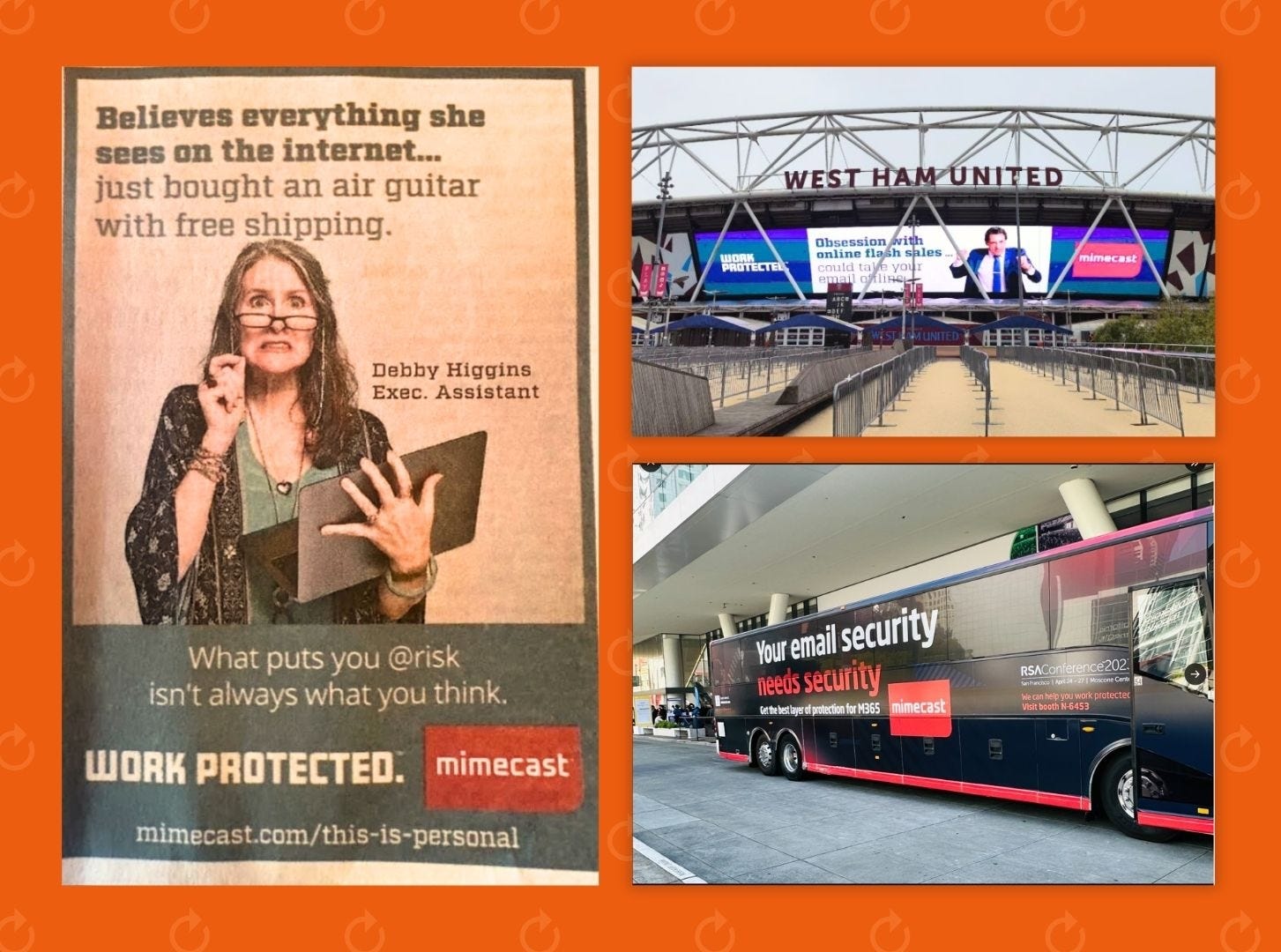
However, Mimecast’s LinkedIn ads in English, German, and French are often visually cluttered and overloaded with text. The company does not advertise on Facebook or Instagram, and, and despite active promotion on Google, their ads rank poorly and often fall behind competitors.
6. Phishy Business Podcast
Another standout result of Mimecast’s partnership with Harvard is the hit podcast, Phishy Business. Every other week, its hosts explore the human side of cybersecurity with humor and insight, covering topics from cybercrime psychology to safety strategies.
Featuring guests like ethical hackers, tech experts, and ex-Navy commanders, the show shares tales of risk, reward, and ridiculousness. Now in its fourth series, Phishy Business has over 40 episodes reaching listeners in 61 countries across Spotify, Apple Podcasts, and Mimecast's website.
🔍 Inside Scoop
Dr. Nathaniel Borenstein was the first person to send an email attachment. In the 1991, he co-founded the Multi-Purpose Internet Mail Extensions (MIME) standard just so he could send and receive photos of his grandchildren, who were scattered across the country.
Intrigued by Mimecast’s name, he reached out to the company, which—in a full-circle moment—brought him on board as Chief Scientist. He held this role for 12 years before departing in July 2022.
7. Thought Leadership
Mimecast’s Threat Intelligence Hub showcases its commitment to proactive defense by identifying threat actors and breaking down their techniques, and methods. By supporting Cybermindz.org, the first mental wellness program for cybersecurity professionals, Mimecast addresses key challenges like burnout and mental health. Through intelligence-sharing, partnerships with industry leaders, and a focus on mental wellness, Mimecast sets the standard as a thought leader in cybersecurity.
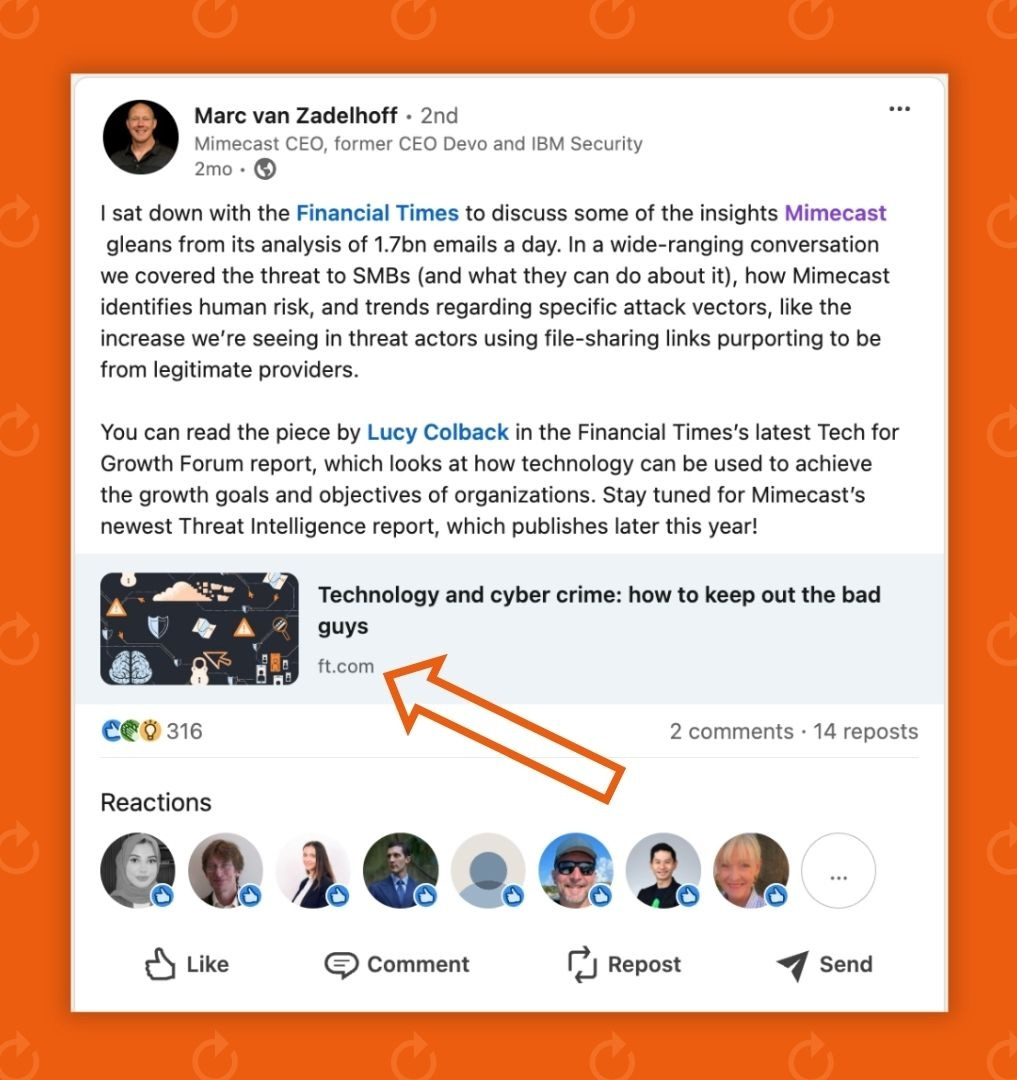
8. Mimecaster Central
Mimecast puts customer experience at the heart of its marketing strategy. From fun quizzes that guide users to the right solution to ongoing support through resources, every touchpoint is designed to boost retention.
A great example is Mimecaster Central, an exclusive online community with over 20,000 users, offering peer discussions, technical support, and valuable resources to help IT professionals elevate their email security, continuity, and archiving strategies.
9. Partner ONE™ Program
With 300+ integrated applications, Mimecast boosts visibility through its Technology Alliance Partners. In 2023, it launched the Partner ONE™ program to scale its network, offering benefits like an accelerated GTM strategy, co-branded marketing, and dedicated support. Initially rolled out in the U.S. and U.K., it has since expanded globally, uniting all MSP and Technology partners under one framework.
10. Culture at Mimecast
Mimecast’s success is powered by a strong culture of volunteering, social good, and a commitment to inclusivity and diversity. This culture is no accident; it’s been intentionally crafted by the co-founders, who are highly selective about who joins the team.
Many early employees have stayed with Mimecast since its inception, creating a close-knit community where people treat each other like friends. This collaborative spirit flows into relationships with customers, partners, and suppliers, making it core to Mimecast’s identity.
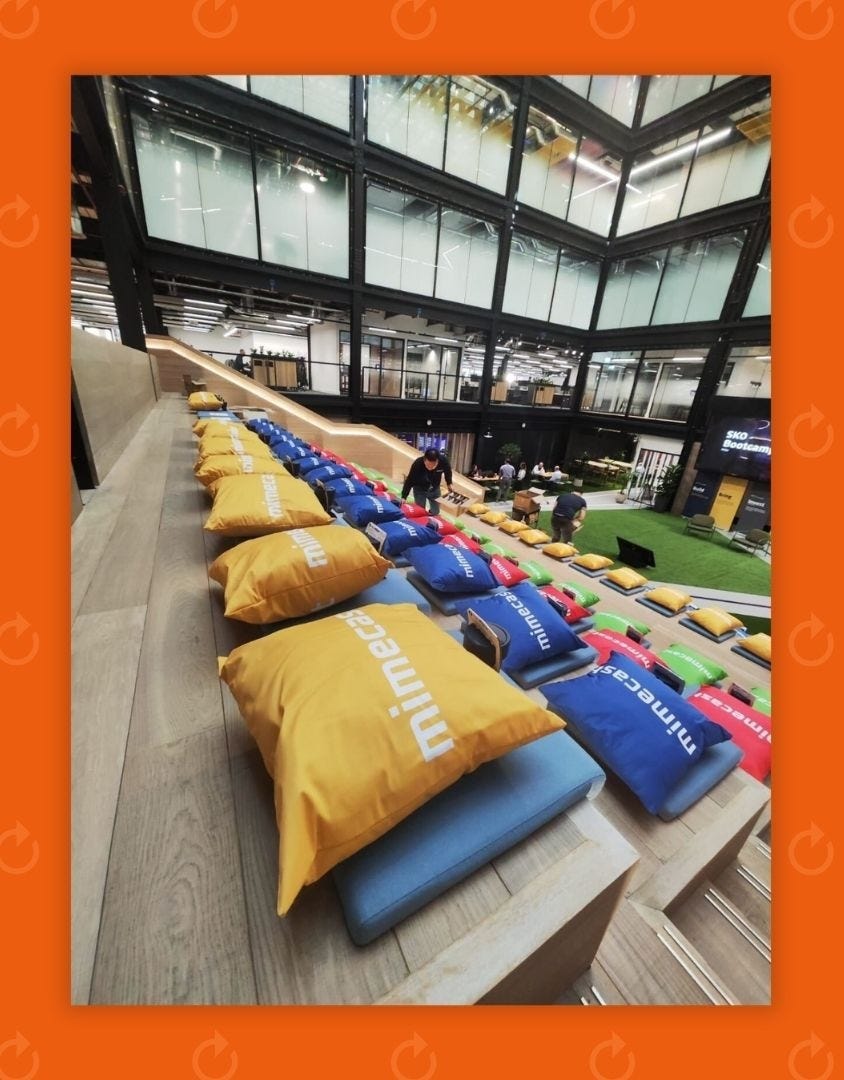
🔍 Inside Scoop
The senior management team at Mimecast calls themselves the "Dead Parents Society," bonded by a shared experience of loss. Peter Bauer lost his mother and grandmother in a car accident at age 11. His co-founder, Neil Murray, also lost a parent as a teenager.
Mimecast’s CFO’s mother was killed in a crash during his childhood, and the Head of Sales lost his mother to suicide. These early life challenges brought the founding team closer, profoundly shaping their perspectives on risk, work, and relationships.
Marketing Statistics
Backlink Profile: Mimecast holds a high Domain Rating (DR) of 91 and a URL Rating (UR) of 40. It has 89K backlinks from 6.7K referring domains, showing a solid backlink profile and authority.
Search Engine Performance: The site ranks for 34.1K keywords, generating 140K monthly organic visits valued at $299K, although it has recently seen a decline in 2.7K keywords and 2.3K visits. Paid search shows 83 targeted keywords, leading to 141 visits at a cost of $879, reflecting a small but growing paid traffic strategy.
Traffic by Location: Most organic traffic comes from the US (60.6K visits, 43.2%), followed by the Great Britain (20.5K), India (11.6K), South Africa (8.5K), and Australia (6.6K). Traffic increased in GB but declined in the US, India, South Africa, and Australia.
Trend Analysis: Organic traffic has seen fluctuations but generally shows stability over time. While paid traffic is low, it has seen recent growth, indicating potential for expansion.
Conclusion
The true test of a company lies in how it adapts and evolves. With co-founders Peter Bauer and Neil Murray passing the reins to new CEO Marc van Zadelhoff, Mimecast is embracing change while staying true to its growth principles.
The company’s recent expansions and strategic marketing shifts—including a revamped partner program and a focus on thought leadership through threat intelligence—signal a commitment to sustainable growth and a vision that honors its founding values.
TL;DR CMO Brief
📦 Resource Library: Mimecast offers a wide range of customer success stories, including testimonials, case studies, eBooks, infographics, podcasts, and videos. This rich collection of social proof reassures potential clients and plays a key role in attracting and retaining customers.
🎙️ Thought Leadership: Through the Phishy Business podcast and Threat Intelligence Hub, Mimecast positions itself as a thought leader. It breaks through digital noise with unconventional video ads, strategic print placements, and clever copywriting.
📅 Strategic Events: Mimecast boosts brand visibility by participating in major conferences like Black Hat USA, RSA, and it-sa, as well as hosting its own events. This approach aids networking, showcases offerings, and supports expansion into new markets.
🤝 Community & Partnerships: Mimecaster Central, an exclusive online community, connects customers for resource-sharing and support. The Partner ONE program unifies Technology and Channel Partners, broadening Mimecast’s reach and solution integration.
🌐 Strong Culture: Mimecast's culture of inclusivity, diversity, and social responsibility shines on social media through #workprotected and #themimecastway. Volunteering stories, team events, and employee experiences humanize the brand and build stronger connections with its audience.







